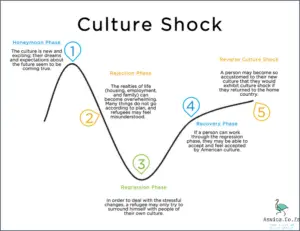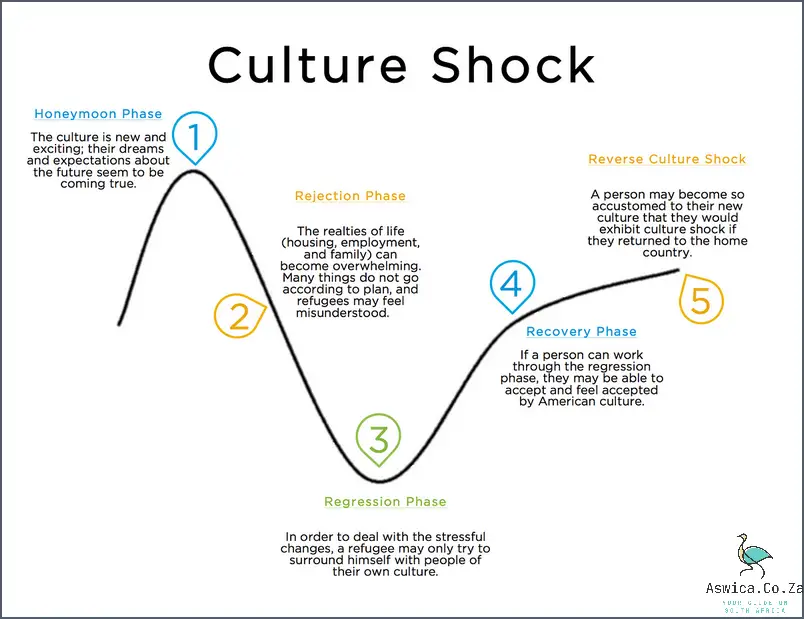
Culture shock is a term used to describe the feeling of disorientation, confusion, and anxiety that can occur when someone visits a foreign country or moves to a new culture. It is a normal psychological reaction to the unfamiliar environment, people, and customs of a new culture. The 5 stages of culture shock are:
1. The Honeymoon Stage – This stage is characterized by feelings of excitement, anticipation, and enthusiasm. At this stage, the new culture seems exciting and interesting.
2. The Frustration Stage – This stage is marked by feelings of confusion, intolerance, and frustration. This can be caused by language and communication barriers, feeling like an outsider, and not being able to find familiar foods and products.
3. The Adjustment Stage – At this stage, the individual begins to adjust to the new culture and begins to find their place. They become more comfortable with the new language and customs, and develop a sense of belonging.
4. The Acceptance Stage – At this stage, the individual has fully adapted to the new culture and is comfortable with it. They understand the customs and language and feel at home.
5. The Autonomy Stage – At
Contents
5 Stages Of Culture Shock
Culture shock is a common experience among those who move to a new country. It is a normal feeling of confusion and anxiety caused by being in an unfamiliar culture. The process can be broken down into five stages: Honeymoon, Negotiation, Adjustment, Mastery, and Acceptance. During the Honeymoon stage, people are excited to explore and experience the new culture. During the Negotiation stage, people start to understand the rules of the new culture and try to find ways to fit in. During the Adjustment stage, people become comfortable with the new culture and start to develop friendships. The Mastery stage occurs when people become knowledgeable about the culture and start to feel like they belong. The last stage is Acceptance, where people are able to fully embrace and enjoy the new culture and have a sense of belonging.
Stage 1: Honeymoon Phase

The honeymoon phase of culture shock is the first stage that new international arrivals experience. It is characterized by excitement, enthusiasm, and optimism. This is the period where expatriates are most likely to feel a sense of adventure and exploration. The honeymoon phase often lasts for a few months, or even longer depending on the individual’s experience.
During the honeymoon phase, an individual is likely to be dazzled by the new culture and may be overwhelmed with the opportunities available. This is the stage where the expatriate can truly appreciate the beauty and wonders of their new location. The honeymoon phase is also a time of intense learning and adaptation as the individual starts to understand the new culture.
The honeymoon phase can be a great way to get to know the culture and begin to form lasting relationships. This is when an individual begins to become comfortable with their new environment and starts to feel at home. It is important to remember that the honeymoon phase does not last forever, and the individual may eventually start to experience culture shock in other stages.
It is important to be aware of the honeymoon phase and to enjoy it while it lasts. This is a time when the individual can appreciate the beauty of the new culture and explore its wonders. As the individual begins to adapt to the culture, it is important to remember to be open-minded and flexible. Doing so will help the individual to make the most of the honeymoon phase and will allow them to deepen their understanding of the culture.
Stage 2: Frustration and Hostility
Culture shock is a term that is often used to describe the disorienting feeling that many people experience when they are thrust into an unfamiliar culture or environment. It is a normal but challenging process that can be broken down into five distinct stages. Understanding each stage and the emotions associated with it can help individuals adjust more smoothly and ultimately enjoy the experience of being in a new place.
The first stage of culture shock is the honeymoon phase. During this period, everything is exciting and new. People are enthralled by the culture, the people, and the environment, and they often feel a sense of invincibility. This period is usually marked by optimism, as people look forward to learning and embracing the new culture.
The second stage of culture shock is frustration and hostility. This stage can be difficult to navigate, as the initial enthusiasm of the honeymoon phase begins to wear off. People may start to feel overwhelmed by the unfamiliar environment and the difficulties that come with it, such as language barriers, cultural differences, and bureaucracy. This can lead to feelings of anger, frustration, and even depression.
The third stage is the adjustment period. During this phase, individuals start to make sense of the new culture, and begin to adjust and adapt to their new environment. They become more adept at navigating the culture and start to feel more comfortable. It is also during this period that people may choose to adopt new customs and habits, or even to learn a new language.

The fourth stage is the mastery stage. At this point, individuals have become accustomed to the culture and can navigate it with relative ease. They may even find themselves enjoying the new culture and could even be seen as an expert on the culture by those around them.
The fifth and final stage of culture shock is the reverse culture shock. This is experienced when a person returns to their home culture after spending an extended period of time in another culture. They may find it difficult to readjust and may struggle to fit back in. This stage can be just as challenging as the initial culture shock.
Culture shock is a normal process that many people experience when they are exposed to a new culture. By understanding the five stages of culture shock, individuals can better prepare for the journey and hopefully make a smoother transition into the new culture.
Stage 3: Gradual Adjustment
Culture shock is a process that we all go through when we encounter a new culture or way of life. It can be a daunting and overwhelming experience, but it can also be an exciting and rewarding one. The five stages of culture shock are denial, frustration, adjustment, acceptance, and adaptation. Each stage is characterized by different emotions and behaviors, and understanding these stages can help us better cope with the culture shock when it arises.
Stage 1: Denial
At the first stage of culture shock, individuals tend to deny that there is any real change in the environment. This is a natural reaction to the sudden change and is often accompanied by feelings of confusion and disbelief. People may feel that the culture they are experiencing is not real or that it will soon pass and they will be back to normal. This stage is marked by a sense of disbelief and lack of understanding.
Stage 2: Frustration
The second stage of culture shock is marked by feelings of frustration. During this stage, individuals become increasingly aware of the differences between the new culture and their own. They may feel overwhelmed by the unfamiliar customs and language, and may struggle to communicate effectively. This stage can also be accompanied by feelings of helplessness and confusion, as well as a strong desire to return to the familiar.

Stage 3: Gradual Adjustment
The third stage of culture shock is characterized by a gradual adjustment to the new culture. Individuals begin to understand the rules and customs associated with the new culture, and they may even start to appreciate some of the differences. During this stage, individuals may also begin to form relationships and build social ties with people from the new culture. This stage is often marked by a sense of accomplishment and a growing sense of acceptance.
Stage 4: Acceptance
The fourth stage of culture shock is marked by increased acceptance of the new culture. Individuals become increasingly comfortable with the customs and language of the new culture, and they start to feel more at home. This stage is often accompanied by a sense of belonging and a desire to explore and learn more about the new culture.
Stage 5: Adaptation
The fifth and final stage of culture shock is marked by true adaptation to the new culture. Individuals become fully integrated into the culture, and they can communicate and interact with ease. This stage is marked by a feeling of belonging and a sense of pride in the newfound culture.
By understanding the five stages of culture shock, individuals can better prepare themselves for the transition into a new culture. Awareness of the stages can also help individuals to better recognize and cope with their emotions when culture shock arises. Ultimately, understanding the stages of culture shock can help individuals to more easily and successfully acclimate to the new culture.
Conclusion
The 5 stages of culture shock are an important concept to understand when navigating a new culture. The stages are: Honeymoon, Hostility, Negotiation, Adjustment and Acceptance. In the Honeymoon stage, there is a sense of excitement and anticipation when experiencing a new culture. Hostility is the stage where initial frustrations and difficulties arise. Negotiation is the stage where the individual is starting to work out the differences between their own culture and the new one. Adjustment is the stage where the individual is actively engaged in the new culture, and Acceptance is the final stage where the individual understands and appreciates the culture.
Overall, it is important to understand the 5 stages of culture shock and how to navigate them. It is also important to remember that each individual will experience culture shock differently and at different rates. With patience, understanding, and a willingness to learn, it is possible to successfully navigate the 5 stages of culture shock and come out the other side with a deeper appreciation for the new culture.



